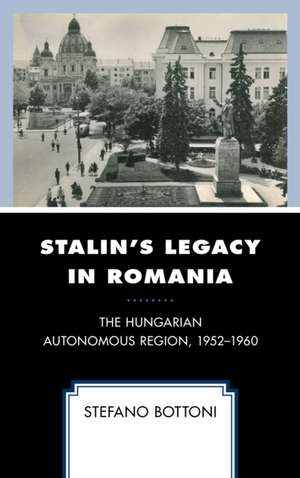STALINS LEGACY IN ROMANIA THE: The Harvard Cold War Studies Book Series
Autor Stefano Bottonien Limba Engleză Hardback – mai 2018
Din seria The Harvard Cold War Studies Book Series
- 27%
 Preț: 791.82 lei
Preț: 791.82 lei - 27%
 Preț: 793.50 lei
Preț: 793.50 lei -
 Preț: 479.50 lei
Preț: 479.50 lei -
 Preț: 472.26 lei
Preț: 472.26 lei - 27%
 Preț: 815.31 lei
Preț: 815.31 lei - 23%
 Preț: 458.89 lei
Preț: 458.89 lei - 27%
 Preț: 798.25 lei
Preț: 798.25 lei - 23%
 Preț: 509.26 lei
Preț: 509.26 lei - 27%
 Preț: 830.76 lei
Preț: 830.76 lei - 27%
 Preț: 1079.73 lei
Preț: 1079.73 lei - 27%
 Preț: 686.05 lei
Preț: 686.05 lei - 27%
 Preț: 792.37 lei
Preț: 792.37 lei - 27%
 Preț: 818.27 lei
Preț: 818.27 lei - 23%
 Preț: 685.98 lei
Preț: 685.98 lei -
 Preț: 479.72 lei
Preț: 479.72 lei -
 Preț: 410.22 lei
Preț: 410.22 lei - 27%
 Preț: 789.65 lei
Preț: 789.65 lei - 23%
 Preț: 654.12 lei
Preț: 654.12 lei - 27%
 Preț: 811.61 lei
Preț: 811.61 lei -
 Preț: 365.00 lei
Preț: 365.00 lei - 27%
 Preț: 964.60 lei
Preț: 964.60 lei - 23%
 Preț: 617.05 lei
Preț: 617.05 lei -
 Preț: 352.40 lei
Preț: 352.40 lei - 27%
 Preț: 977.85 lei
Preț: 977.85 lei - 27%
 Preț: 898.38 lei
Preț: 898.38 lei - 23%
 Preț: 483.98 lei
Preț: 483.98 lei - 23%
 Preț: 503.73 lei
Preț: 503.73 lei -
 Preț: 476.46 lei
Preț: 476.46 lei - 27%
 Preț: 1094.01 lei
Preț: 1094.01 lei - 27%
 Preț: 736.73 lei
Preț: 736.73 lei -
 Preț: 344.23 lei
Preț: 344.23 lei -
 Preț: 476.86 lei
Preț: 476.86 lei - 23%
 Preț: 462.98 lei
Preț: 462.98 lei - 27%
 Preț: 1079.73 lei
Preț: 1079.73 lei - 27%
 Preț: 935.47 lei
Preț: 935.47 lei - 23%
 Preț: 438.74 lei
Preț: 438.74 lei - 23%
 Preț: 589.75 lei
Preț: 589.75 lei - 27%
 Preț: 725.82 lei
Preț: 725.82 lei - 27%
 Preț: 716.53 lei
Preț: 716.53 lei -
 Preț: 379.43 lei
Preț: 379.43 lei -
 Preț: 315.05 lei
Preț: 315.05 lei -
 Preț: 369.00 lei
Preț: 369.00 lei - 33%
 Preț: 507.81 lei
Preț: 507.81 lei
Preț: 818.41 lei
Preț vechi: 1121.12 lei
-27% Nou
Puncte Express: 1228
Preț estimativ în valută:
156.60€ • 163.94$ • 129.58£
156.60€ • 163.94$ • 129.58£
Carte tipărită la comandă
Livrare economică 07-21 aprilie
Preluare comenzi: 021 569.72.76
Specificații
ISBN-13: 9781498551212
ISBN-10: 1498551211
Pagini: 434
Dimensiuni: 152 x 229 x 29 mm
Greutate: 0.74 kg
Editura: Rowman & Littlefield
Seria The Harvard Cold War Studies Book Series
ISBN-10: 1498551211
Pagini: 434
Dimensiuni: 152 x 229 x 29 mm
Greutate: 0.74 kg
Editura: Rowman & Littlefield
Seria The Harvard Cold War Studies Book Series
Notă biografică
Stefano Bottoni is senior fellow at the Research Center for the Humanities of the Hungarian Academy of Sciences.
Descriere
This study examines the creation and subsequent dismantling of the Hungarian Autonomous Region in the 1950s. The author analyzes the influence of Soviet aid and the ways in which the Romanian Communist Party dealt with the country's various ethnic and national groups.
